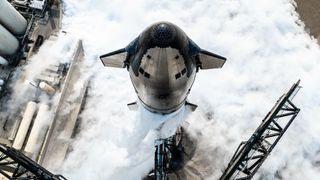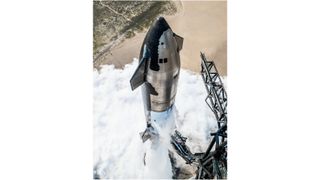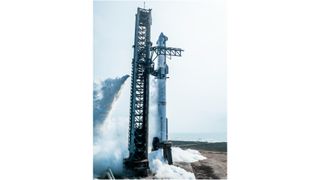It was the second "wet dress rehearsal" for this Starship vehicle, which could launch in just a week or so.

SpaceX has fueled up its Starship megarocket again, ramping up preparations for the huge vehicle's upcoming test flight.
The operation, known as a wet dress rehearsal (WDR), occurred on Tuesday (May 28) at SpaceX's Starbase site in South Texas. The company pumped huge quantities of liquid oxygen and liquid methane into Starship's first and second stages, which are known, respectively, as Super Heavy and Starship (or just "Ship" for short).
"Starship and Super Heavy loaded with more than 10 million pounds of propellant in a rehearsal ahead of Flight 4. Launch is targeted as early as June 5, pending regulatory approval," SpaceX said today (May 29) in an X post, which also shared photos of the procedure.

It was the second WDR for this Starship vehicle, following one that occurred on May 20.
The tests are part of prelaunch prep for Starship's fourth-ever flight, which, as SpaceX noted in the X post, could launch as soon as June 5. (The company still needs approval from the U.S. Federal Aviation Administration for a proposed modification to its Starship launch license, to be clear.)
The first three Starship test flights took place in April 2023, November 2023 and March 14 of this year. The vehicle has performed better on each successive flight. Starship's two stages failed to separate on the debut mission, for example, which ended just four minutes after launch. But flight 3 lasted nearly 50 minutes, concluding when Ship broke apart during its reentry to Earth's atmosphere.
Flight 4's primary goal "is getting through max reentry heating," SpaceX founder and CEO Elon Musk said in a May 20 X post.

When fully stacked, Starship stands nearly 400 feet (122 meters) tall. It's the biggest and most powerful rocket ever built, and it's designed to be fully and rapidly reusable.
SpaceX thinks Starship could transform spaceflight, making Mars settlements and other ambitious exploration feats economically feasible. NASA is a believer in the vehicle, choosing it to be the first crewed lunar lander for its Artemis moon program.
Starship is currently scheduled to land NASA astronauts on the moon in late 2025 on the Artemis 3 mission, though the vehicle will need to ace quite a few test flights before people climb aboard.


 TheCoinrise Media
TheCoinrise Media Thecoinrepublic.com
Thecoinrepublic.com Optimisus
Optimisus CryptoPotato_News
CryptoPotato_News DogeHome
DogeHome BlockchainReporter
BlockchainReporter Optimisus
Optimisus TheCoinrise Media
TheCoinrise Media






















